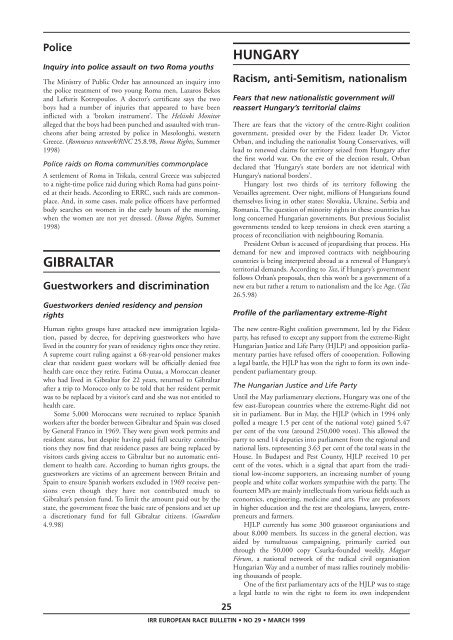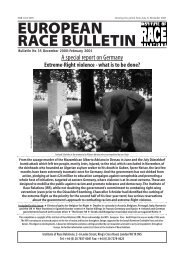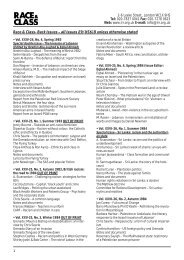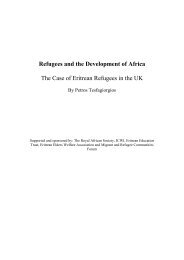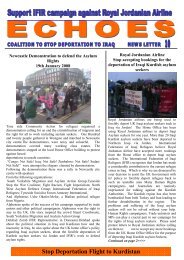EUROPEAN RACE BULLETIN - Institute of Race Relations
EUROPEAN RACE BULLETIN - Institute of Race Relations
EUROPEAN RACE BULLETIN - Institute of Race Relations
You also want an ePaper? Increase the reach of your titles
YUMPU automatically turns print PDFs into web optimized ePapers that Google loves.
PoliceInquiry into police assault on two Roma youthsThe Ministry <strong>of</strong> Public Order has announced an inquiry intothe police treatment <strong>of</strong> two young Roma men, Lazaros Bekosand Lefteris Kotropoulos. A doctor’s certificate says the twoboys had a number <strong>of</strong> injuries that appeared to have beeninflicted with a ‘broken instrument’. The Helsinki Monitoralleged that the boys had been punched and assaulted with truncheonsafter being arrested by police in Mesolonghi, westernGreece. (Romnews network/RNC 25.8.98, Roma Rights, Summer1998)Police raids on Roma communities commonplaceA settlement <strong>of</strong> Roma in Trikala, central Greece was subjectedto a night-time police raid during which Roma had guns pointedat their heads. According to ERRC, such raids are commonplace.And, in some cases, male police <strong>of</strong>ficers have performedbody searches on women in the early hours <strong>of</strong> the morning,when the women are not yet dressed. (Roma Rights, Summer1998)GIBRALTARGuestworkers and discriminationGuestworkers denied residency and pensionrightsHuman rights groups have attacked new immigration legislation,passed by decree, for depriving guestworkers who havelived in the country for years <strong>of</strong> residency rights once they retire.A supreme court ruling against a 68-year-old pensioner makesclear that resident guest workers will be <strong>of</strong>ficially denied freehealth care once they retire. Fatima Ouzaa, a Moroccan cleanerwho had lived in Gibraltar for 22 years, returned to Gibraltarafter a trip to Morocco only to be told that her resident permitwas to be replaced by a visitor’s card and she was not entitled tohealth care.Some 5,000 Moroccans were recruited to replace Spanishworkers after the border between Gibraltar and Spain was closedby General Franco in 1969. They were given work permits andresident status, but despite having paid full security contributionsthey now find that residence passes are being replaced byvisitors cards giving access to Gibraltar but no automatic entitlementto health care. According to human rights groups, theguestworkers are victims <strong>of</strong> an agreement between Britain andSpain to ensure Spanish workers excluded in 1969 receive pensionseven though they have not contributed much toGibraltar’s pension fund. To limit the amount paid out by thestate, the government froze the basic rate <strong>of</strong> pensions and set upa discretionary fund for full Gibraltar citizens. (Guardian4.9.98)25HUNGARYIRR <strong>EUROPEAN</strong> <strong>RACE</strong> <strong>BULLETIN</strong> • NO 29 • MARCH 1999Racism, anti-Semitism, nationalismFears that new nationalistic government willreassert Hungary’s territorial claimsThere are fears that the victory <strong>of</strong> the centre-Right coalitiongovernment, presided over by the Fidesz leader Dr. VictorOrban, and including the nationalist Young Conservatives, willlead to renewed claims for territory seized from Hungary afterthe first world war. On the eve <strong>of</strong> the election result, Orbandeclared that ‘Hungary’s state borders are not identical withHungary’s national borders’.Hungary lost two thirds <strong>of</strong> its territory following theVersailles agreement. Over night, millions <strong>of</strong> Hungarians foundthemselves living in other states: Slovakia, Ukraine, Serbia andRomania. The question <strong>of</strong> minority rights in these countries haslong concerned Hungarian governments. But previous Socialistgovernments tended to keep tensions in check even starting aprocess <strong>of</strong> reconciliation with neighbouring Romania.President Orban is accused <strong>of</strong> jeopardising that process. Hisdemand for new and improved contracts with neighbouringcountries is being interpreted abroad as a renewal <strong>of</strong> Hungary’sterritorial demands. According to Taz, if Hungary’s governmentfollows Orban’s proposals, then this won’t be a government <strong>of</strong> anew era but rather a return to nationalism and the Ice Age. (Taz26.5.98)Pr<strong>of</strong>ile <strong>of</strong> the parliamentary extreme-RightThe new centre-Right coalition government, led by the Fideszparty, has refused to except any support from the extreme-RightHungarian Justice and Life Party (HJLP) and opposition parliamentaryparties have refused <strong>of</strong>fers <strong>of</strong> coooperation. Followinga legal battle, the HJLP has won the right to form its own independentparliamentary group.The Hungarian Justice and Life PartyUntil the May parliamentary elections, Hungary was one <strong>of</strong> thefew east-European countries where the extreme-Right did notsit in parliament. But in May, the HJLP (which in 1994 onlypolled a meagre 1.5 per cent <strong>of</strong> the national vote) gained 5.47per cent <strong>of</strong> the vote (around 250,000 votes). This allowed theparty to send 14 deputies into parliament from the regional andnational lists, representing 3.63 per cent <strong>of</strong> the total seats in theHouse. In Budapest and Pest County, HJLP received 10 percent <strong>of</strong> the votes, which is a signal that apart from the traditionallow-income supporters, an increasing number <strong>of</strong> youngpeople and white collar workers sympathise with the party. Thefourteen MPs are mainly intellectuals from various fields such aseconomics, engineering, medicine and arts. Five are pr<strong>of</strong>essorsin higher education and the rest are theologians, lawyers, entrepreneursand farmers.HJLP currently has some 300 grassroot organisations andabout 8,000 members. Its success in the general election, wasaided by tumultuous campaigning, primarily carried outthrough the 50,000 copy Csurka-founded weekly, MagyarFórum, a national network <strong>of</strong> the radical civil organisationHungarian Way and a number <strong>of</strong> mass rallies routinely mobilisingthousands <strong>of</strong> people.One <strong>of</strong> the first parliamentary acts <strong>of</strong> the HJLP was to stagea legal battle to win the right to form its own independent


